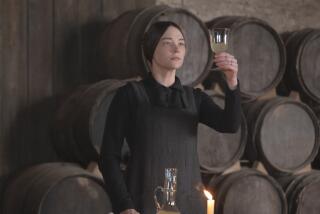Corinne Calvet; French Actress
- Share via
Corinne Calvet, a French actress who came to Hollywood and made headlines--some for the movies she made and others for the highly publicized legal battles she waged--has died. She was 76.
Calvet, a longtime resident of Santa Monica, died Saturday at UCLA Medical Center of a cerebral hemorrhage, according to a friend, Dianne Miller. She was stricken Friday evening at her home and taken to UCLA.
In her heyday in the 1950s, the glamorous Calvet appeared in a number of well-regarded comedies and dramas, including “What Price Glory?” with James Cagney, “Sailor Beware” with Dean Martin and Jerry Lewis, and “On the Riviera” with Danny Kaye. Two of her films--”What Price Glory?” and “When Willie Comes Marching Home”--were directed by John Ford.
Although she seemed to find steady work, some viewed her screen talents with disdain. She was awarded a Roscoe by the Harvard Lampoon for giving one of the worst film performances of 1951 in her part in “On the Riviera.” But the Lampoon also named Dean Martin and Jerry Lewis the “worst comic duo,” for anything they appeared in.
A year later, Calvet made headlines by filing a million-dollar slander suit against Zsa Zsa Gabor, charging that Gabor had told several people, including a prominent Hollywood columnist, that Calvet was not actually French. The indignant Calvet proclaimed that she was known throughout the world as a French actress, born in Paris, and “truly possesses the attributes portrayed by her in her various roles.”
Gabor countered that Calvet’s suit was without merit. The court apparently agreed because the legal wrangle quickly disappeared from the media.
It was just one of a number of court appearances over the years for Calvet.
Her most highly publicized court battle came in 1967, when her longtime boyfriend, the well-to-do Donald Scott, sued Calvet to recover assets that Scott had put under her name in an effort to hide them from his wife in a divorce battle.
Saying that Calvet had used voodoo to control him, Scott settled his differences with her after a bitter two-week trial.
Calvet once told a reporter that American men make wonderful husbands if you don’t love them. But if you love them, she advised, don’t marry them.
“I don’t mean they are lousy lovers,” Calvet said. “I just think they are little boys who don’t know what they want. In America, you don’t have romances, you have affairs. And these affairs really lack class.”
Born Corinne Dibos to a well-to-do family, Calvet studied criminal law at the Sorbonne before turning to acting.
“A lawyer needs exactly what an actor needs, strong personality, persuasive powers and a good voice,” she noted years later.
After leaving the Sorbonne, she appeared in radio and stage productions in France after World War II, before going on to film work.
Shortly after the end of the war, she came to the attention of Paramount Studios, which brought her to the U.S. The studio changed her image, however, producing the glamorous presence she became known for on the silver screen. Her first American film was “Rope of Sand,” starring Burt Lancaster and Paul Henreid.
She guest-starred in a few television series in the 1970s but for the most part left the entertainment industry for a career as a therapist.
Her 1983 memoir, “Has Corinne Been a Good Girl?” was critical of the studio system in Hollywood, which, she said, typecast her in roles that had little to do with her true acting ability.
She is survived by a son, Michael.
More to Read
Only good movies
Get the Indie Focus newsletter, Mark Olsen's weekly guide to the world of cinema.
You may occasionally receive promotional content from the Los Angeles Times.










